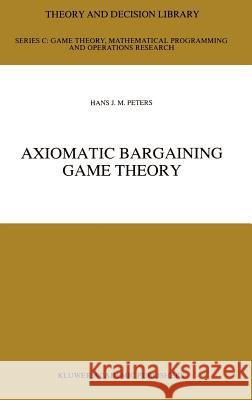Axiomatic Bargaining Game Theory » książka
Axiomatic Bargaining Game Theory
ISBN-13: 9780792318736 / Angielski / Twarda / 1992 / 242 str.
Many social or economic conflict situations can be modeled by specifying the alternatives on which the involved parties may agree, and a special alternative which summarizes what happens in the event that no agreement is reached. Such a model is called a bargaining game, and a prescription assigning an alternative to each bargaining game is called a bargaining solution. In the cooperative game-theoretical approach, bargaining solutions are mathematically characterized by desirable properties, usually called axioms. In the noncooperative approach, solutions are derived as equilibria of strategic models describing an underlying bargaining procedure.
Axiomatic Bargaining Game Theory provides the reader with an up-to-date survey of cooperative, axiomatic models of bargaining, starting with Nash's seminal paper, The Bargaining Problem. It presents an overview of the main results in this area during the past four decades. Axiomatic Bargaining Game Theory provides a chapter on noncooperative models of bargaining, in particular on those models leading to bargaining solutions that also result from the axiomatic approach.
The main existing axiomatizations of solutions for coalitional bargaining games are included, as well as an auxiliary chapter on the relevant demands from utility theory.











